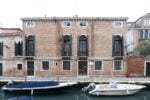16. Mostra Internazionale di Architettura – Station Russia
.jpg)
La Russia partecipa alla Biennale Architettura 2018 col progetto Station Russia.
Comunicato stampa
The Russian Pavilion is delighted to present Station Russia, which explores the past, present and future of the Russian railways. In an environment which is in parts uninhabitable, to the extent that roads cannot be built, railways have become the lifeblood of the largest country in the world. Station Russia explores how they, and the people who use them, negotiate the vast and often empty expanse of the Russian landscape.
In a new exhibition conceived and created for the 16th Venice Architecture Biennale, the national pavilion has been transformed into a train station. Within its five ‘Halls’, contemporary Russian architects, designers and artists use sound and multimedia installations, as well as photographs, models and artefacts, to explore the past of the network and to present their vision of its future.
The exhibition is supported by JSC Russian Railways, whose involvement reflects its pivotal role in maintaining the strategic importance of the Russian railway network. The focus of the exhibition forms a parallel with the history of the Russian Pavilion itself, which was inaugurated in 1914. The building’s designer, Alexey Shchusev, was also responsible for the Kazansky Railway Station – the Moscow terminus of the line which first connected the capital with Ryazan, in the south east of the country, and beyond, to Kazakhstan and central Asia.
Pavlovsk Vauxhall, Station Russia, Venice Architecture Biennale 2018, courtesy the Russian Pavilion, Venice
Hall 1: The Geography of Free Space
The first hall of the Pavilion demonstrates the complexity of the railway system that spreads throughout Russia’s vast empty spaces and multiple time zones. An infographic installation by Russian artist Arden Vald presents the country’s railways as both its circulatory system - its living, vital veins - and as its backbone, supplying crucial connectivity for the Russian populous, who depend on this form of transport as the only way to navigate an often formidable landscape.
Hall 2: The Architectural Depot
In the central hall of the Pavilion, The Architectural Depot showcases plans and models of train stations past and present, such as the renovated station at Sochi (Studio 44, Architect: Nikita Yavein) and the proposed High Speed Rail connecting Moscow to Kazan (Metrogiprotrans, Architect: Nikolai Shumakov).
A large-scale installation, suspended above the central stairwell, recreates the first Russian voksal – or Vauxhall - a train station and Pleasure Gardens in the suburb of Pavlovsk, built in the early 19th century, which functioned both as a terminus for the first Russian railway and as a summer retreat for St Petersburg’s elite.
Hall 3: The Waiting Hall of the Future
The Waiting Hall of the Future presents two projects dedicated to the future of habitable development surrounding train stations: a re-examination of the futuristic New Unit Settlements (NUS), first shown at fifty years ago at the Triennale di Milano in 1968, and a showcase of proposed developments around one of the busiest railway termini squares in central Moscow, put forward by a new generation of contemporary Russian architects, Citizenstudio and Studio 911 (Citizenstudio: M. Beilin, D. Nikishin. Studio 911: V. Krylov, A. Churzin, I. Assorov). Titled “A Dichotomy of Free Space”, the proposals reflect on train stations in other megacities to suggest ideas for how the area around Moscow’s train station might be repurposed. On the walls of the gallery, Graffiti artist Anatoly Akue has created an imagined visualisation of the urban surroundings of this future space.
Hall 4: The Crypt of Memories
In The Crypt of Memories, the walls of the Pavilion’s lower gallery are lined with steel cabinets, mimicking a traditional luggage room. The lockers, which visitors are invited to open and explore, hold ‘lost and found’ property: historical artefacts, including Soviet memorabilia, which reveal the history of the material world behind the Russian Railway.
Hall 5: Aboard the Free Space
The final hall of the Pavilion brings the significance of the railway in Russia full circle, with a short-film by director Daniil Zinchenko. Presented behind the frosty window of a train carriage, Seven Days in Seven Minutes shows Daniil’s journey from Moscow to Vladivostok, an excursion of 9,300km along the route of the Trans-Siberian Express, to meet his long-lost grandfather. The film offers visitors to the Pavilion a marked contrast to the heat of Venice, and highlights again the vital role of train travel in the country, as well as giving a human aspect to the connectivity it facilitates.
Nikolai Shumakovm, Model of Kazan Station, New High Speed Rail Connection Between Moscow and Kazan, Courtesy Nikolai Shumakovm
To download the press release please click here
To download the image sheet please click here
About the Russian Pavilion
The Russian Pavilion in the Giardini in Venice was designed by Alexei Shchusev and ceremonially opened by Grand Duchess Maria Pavlovna of Russia in 1914. Russian artists have been participating in the Biennale from the first Venice Exhibition of 1895 and since, over 800 Russian artists have participated from leading names like Repin, Malevich and Kabakov to emerging artists. Semyon Mikhailovsky was appointed Commissioner of the Russian Pavilion at the art and architecture Venice Biennales in 2016 and will hold the post until 2021. The Russian Pavilion is under the auspices of the Ministry of Culture of the Russian Federation. The exhibition has been made possible with the support of JSCo “RZD” – RUSSIAN Railways.
About JSCo Russian Railways (RZD)
JSCo Russian Railways (RZD) is one of the largest enterprises in Russia and in 2012 became one of the largest transportation companies in the world, owning the world's third-longest rail network. Founded in 2003, JSCo Russian Railways (RZD) has grown to become an industry-leader in freight transportation, long-distance and suburban passenger services and provision and construction of infrastructure. The Russian Pavilion is grateful for the support of JSCo Russian Railways (RZD) as the general partner of this exhibition, and as such has generously provided privately-sourced funding for the 2018 Russian Pavilion, Station Russia.



